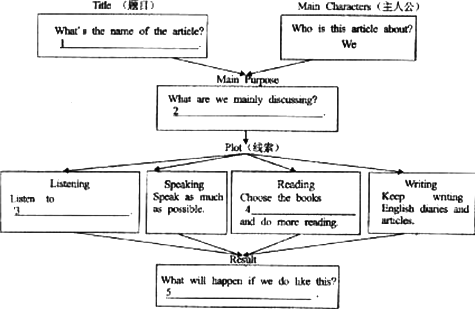
题目列表(包括答案和解析)
|
阅读Fishing Can Be Dangerous Old Peter liked fishing.Whenever he had any free time he drove into the countryside, found a good place to fish, and spent a few hours fishing.The problem was that most of the best places to fish were on private land, and Peter often had to pull his rod out of the water quickly and run off with it when the owner of the land came along. One day he was sitting by a river that ran through a rich man's property when he fell asleep. He was awakened by a voice saying, “You'll never catch anything using that bait.” Peter looked up and saw a man standing behind him. “What do you mean?”Peter said.“There's nothing wrong with this bait.I always use it.I've caught thirty fish with it today already.” “How interesting!” the man said.“Do you know who I am?” Peter shook his head. “I'm the owner of this land.” Peter thought very quickly. “Do you know who I am?” he asked. The man shook his head. “I'm the biggest liar in the country,” Peter told him. And with these words he pulled his line out of the water and ran off as fast as he could. Notes: whenever/wen'ev+/adv.无论何时 private/'praivit/adj.私人的 rod/'r&d/n.竿 owner/'+un+/n.所有者 property/'pr&p+ti/n.财产 awakened n.(awaken的过去分词…was awakened by…:……被……唤醒 bait/beit/n.诱饵 liar/'lai+/n.说谎者 line/lain/n.线 Exercises: A.Choose the best answer to each question about the story.(根据故事内容,选择最佳答案) 1.Whenever Peter had some spare time he ________. a)went for a drive in his car b)visited his friends c)went fishing d)looked for some private land 2.Most of the best places to fish were ________. a)owned by someone b)a long way from Peter's home c)difficult to find d)near a river 3.Peter told the man ________. a)not to use his bait b)that his bait was very good c)that he never used bait d)that the bait wasn't any good 4.Why did Peter tell the man he was “the biggest liar in the country”? a)He had lied to him about the fish. b)He didn't know who he was. c)He was using the wrong bait. d)He wanted the man to believe he had lied(撒谎). B.Complete sentences将句子a)、b)、c)、d)分别与短语e)、f)、g)、h)连线,使其成为完整的句子。)
C.What do you like doing in your free time? 1.列举业余时间你通常做的事:fishing, going for a drive, playing basketball, listening to the music________, ________, ________, ________, ________ 2.What should we do in our spare time?Give comments评价所写的活动 如:We should go fishing in our spare time.It’s very relaxing. 3.写信给你的朋友告诉她/他,你业余时间喜欢做什么及原因(可以用I,…, you’ll…)。 | |||||||||
| |||||||||||||||||||||||||||||||||||||||||||||||||||||||||||
Can you swim?Do you like swimming?Yes?Well, how can you learn to swim?I think the best way is to go into the water and learn.I' m afraid you'll never learn to swim just by reading books about swimming or look-ing at others swimming.It's the same with the English study for us kids today.We must practice, practice and practice.
Listening and speaking are very important for beginners.The children in English-speaking countries first listen to others.Then they try to imitate(模仿)and speak.We can listen to English programs on radio.You may just understand a few words.It doesn' t matter.Just be relaxed, try to get the main topics(论题,话题), then the main ideas, then the main sentences(句子), then the key words, then the full meaning.As for speaking, speak as much as you can.
Reading and writing are more important for school students.First we must choose the books we're interested in.A lot of reading will improve your language sense(语感).This is the most important.
Keep writing English diaries(日记).We can also write English articles.You may even post them to English magazines.Don't be afraid of failure(失败).Failure is the mother of success.
Easier said than done.Well, let's do more practice from now on.I' m sure you' ll learn English well in this way.

湖北省互联网违法和不良信息举报平台 | 网上有害信息举报专区 | 电信诈骗举报专区 | 涉历史虚无主义有害信息举报专区 | 涉企侵权举报专区
违法和不良信息举报电话:027-86699610 举报邮箱:58377363@163.com